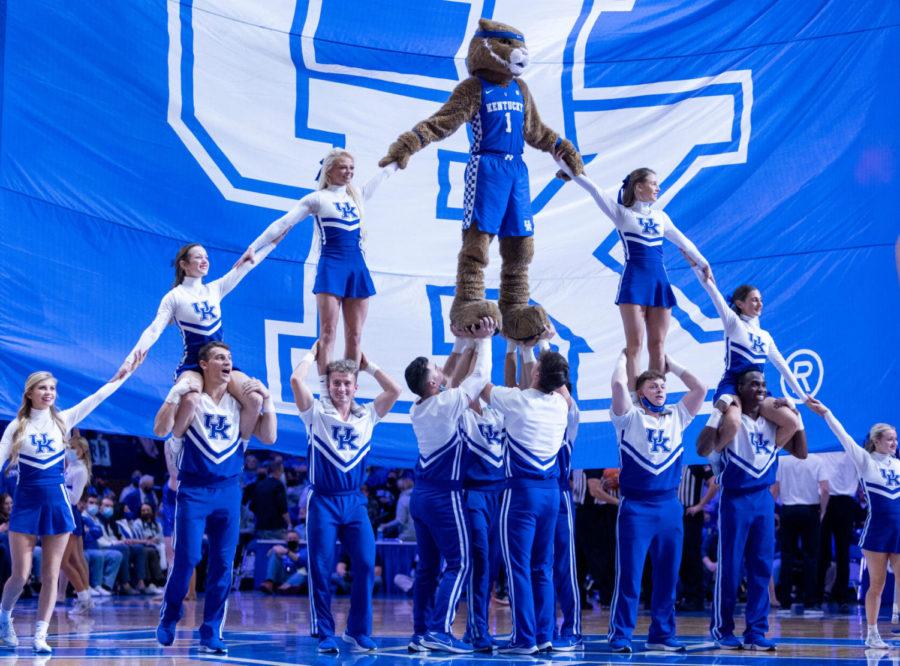What it takes to be a cheerleader at UK
Kentucky cheerleaders perform during the UK vs. Vanderbilt basketball game on Wednesday, Feb. 2, 2022, at Rupp Arena in Lexington, Kentucky. UK won 77-70. Photo by Jack Weaver | Staff
November 10, 2022
UK’s cheer team competes at the Universal Cheerleaders Association Division I-A College National Championships and has won 24 national championships, but victories are not earned in a day.
Cheerleaders have practices four days a week that last around two to two-and-a-half hours. They also have workouts three days a week that last for an hour.
“If you wanna be great, you do what you have to do to be great,” Hunter Henderson, a cheerleader and senior majoring in health promotion, said. “I think a lot of the people in our program have a really strong mindset and are incredibly willed. I think that they all have the same goal in mind.”
In addition to that, cheerleaders have the option of attending an open gym session, which is a time period outside of practice where they can work on improving their skills.
“It’s not abnormal to see three-fourths of the team in here on the days that you don’t have practice for three to four hours,” Henderson said. “The open gym is not mandatory … When there’s an opportunity to put extra work in, I think the majority of us would rather put the extra work in than not put the extra work in.”
Then there are games to cheer for.
The cheerleading team is split into a blue squad and a white squad. The blue squad cheers for home and away football games, mens basketball games and gymnastics. The white squad cheers for home football games, volleyball games and womens basketball games.
“It’s all one big team, but then it’s split so that they don’t have to be somewhere literally every night,” Timothy Letcher said.
Letcher is the website coordinator for UKathletics.com and contact for cheer, dance and STUNT.
However, there are still times when cheerleaders have back to back games to support. Ashley Dinda, a cheerleader and senior majoring in biology, recalls periods when she had a game to attend every night. Times where basketball, volleyball, gymnastics, and football could all have games going on in the same week.
And during those games, they have a job to do.
“We’re here to be ambassadors for the university and to support those sport teams, so we spend the whole year making sure that we’re able to do that to the best of our abilities,” Henderson said.
Cheerleaders contribute to the vibrant atmosphere of any game by cheering on the team and boosting the energy of the crowd, regardless of how well UK is performing on the field or court. Dylan Gessner, a cheerleader and graduate student, commented that win or lose, cheerleaders still showcase their skills – stunts, baskets and pyramids – and enjoy themselves while doing so.
On top of cheering for games, both blue and white squads compete at UCA College Nationals, an experience vastly different from a four-hour football game. Cheerleaders only have two minutes and 30 seconds to execute three to six skills perfectly. One chance is all they get.
“You prepare for the whole year, and you have two minutes and 30 seconds to prove that you are the best team in the country, and I think that brings out a special type of athlete,” Henderson said.
Cheerleaders are also not exempt from juggling their responsibilities as students. On top of a packed cheerleading schedule, they have assignments from classes to complete.
Rachel Littrell, a cheerleader and sophomore majoring in clinical leadership and management, said that time management, and finding opportunities to get coursework done, is the key to balancing school and cheer.
And their schedule only gets busier.
“You’re about to go into the season where you’ve got football and basketball going on at the same time, so they might have four games in a week, in addition to going to school, in addition to life, so yeah, it’s a lot,” Letcher said.
Cheerleaders have resources they can use to help them with their academics, such as CATS, The Center for Academic & Tutorial Services. But they also rely on each other for help.
“It’s really nice to have a family and say, ‘Hey so-and-so, I know you’re a physics major, you’re a biology major, you’re a communications major, can you come help me with this homework? Can you come help me study for this test? Or do you have some extra notes or anything I can look over?” Henderson said.
The power of community extends beyond the walls of their gym as well. The cheerleading team often makes appearances at surrounding schools, nursing homes, hospitals and any event where their presence might be needed.
“It’s not just about cheering on the sports teams, it’s about cheering on everyone,” Gessner said.
And if there is anything the cheerleading team can do to support members of their local communities, they will. Henderson said he does not think that Ryan Martin O’Connor, the head coach for UK cheerleading, would ever turn down an appearance where the cheerleading team is needed.
“This is the only sport where we’re competing or doing our job and executing our skills while trying to support another program,” said Henderson.
And yet despite their work ethic and drive for excellence in their sport, their school, their studies and their communities, there are still doubts about what it really takes to be a cheerleader.
“Oftentimes we are undermined; people don’t really get to see, sometimes, what we do. So we are blessed to have something like what we did for our Big Blue Madness routine. To be able to show our peers this is what we do, this is what we are capable of,” Henderson said.

































































































































































mommy • Nov 14, 2024 at 5:47 pm
omgomgomgomogomogmogmgomgogmogmogmgogmogmgomgogmomogmogmgomgomgomomgomogmgo so good cheer team